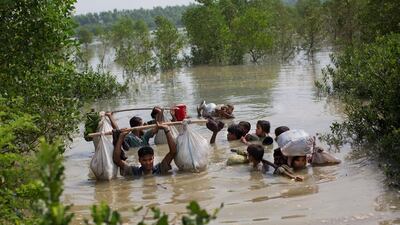Last Monday, these pages described the suffering of the Muslim Rohingya people of Myanmar as "a stain on humanity's conscience". At the time, some 50,000 Rohingya had fled in the direction of Bangladesh in a desperate bid to save themselves from the Myanmar military's murderous rampage through Rakhine, the northern state which the Rohingya have called their home for more than half a millennium. Today, the number of Rohingya men, women and children who have abandoned their homes over the last week for refuge in Bangladesh stands at more than 120,000. This is more than a stain on humanity's conscience. It is a crime against humanity.
The crime is being carried out with impunity in part because Aung San Suu Kyi, the de facto head of Myanmar's government, refuses to condemn it. In fact, the incendiary pronouncements that have been circulated in her name by her office suggest she might even be complicit in exacerbating the violence. Boris Johnson, the British foreign secretary, has warned that the treatment of the Rohingya is "besmirching the reputation" of Myanmar. The young Pakistani activist Malala Yousafzai has called on Ms Suu Kyi, a fellow Nobel Peace Prize laureate, to condemn the "tragic and shameful" treatment of the Rohingya.
_________________
Read more from Opinion on the Rohingya
The suffering of the Rohingya people is a stain on humanity's conscience
_________________
Such concern is not recent. Last year, a chorus of international luminaries, including more than a dozen Nobel Prize recipients, signed an open letter expressing alarm at the "potential for genocide" of the Rohingya. To be sure, Ms Suu Kyi has no power over Myanmar's military, who only recently relinquished their absolute control over the country. Still barred from the presidency, she has not had sufficient time to consolidate her authority as state counsellor, a role created only two years ago. Still, the only noise she has made has been in support of the military, not the military's victims.
The Myanmar state remains unmoved by international appeals because it regards the Rohingya as a foreign body defiling the ethno-religious purity of the country, much the same way as Sri Lanka, another Buddhist-majority state, once regarded the Tamils. Ethnocentrism, history teaches us, is the fuel that propels genocides. This is why what is happening to the Rohingya in Myanmar is not just a “Muslim” issue. It ought to concern all humanity.
Contrary to the propaganda pumped out by the government, the Rohingya are not "outsiders". Their attachment to Rakhine predates the birth of modern Myanmar. Myanmar has three tiers of citizenship; the Rohingya are excluded from all of them. An advisory commission constituted by Ms Suu Kyi and led by Kofi Annan recently recommended that Myanmar's laws should be amended to grant citizenship to the Rohingya. The world should apply pressure on Myanmar to halt the violence, admit international monitors and change its citizenship laws. The Myanmar state should be an embodiment of the diversity of its people, not a repository of the prejudices of its majority.
Follow The National's Opinion section on Twitter
________________
Also read:
Rohingya crisis: Malala Yousafzai calls for Aung San Suu Kyi to condemn violence in Myanmar
Britain's Boris Johnson warns Aung San Suu Kyi over Rohingya

